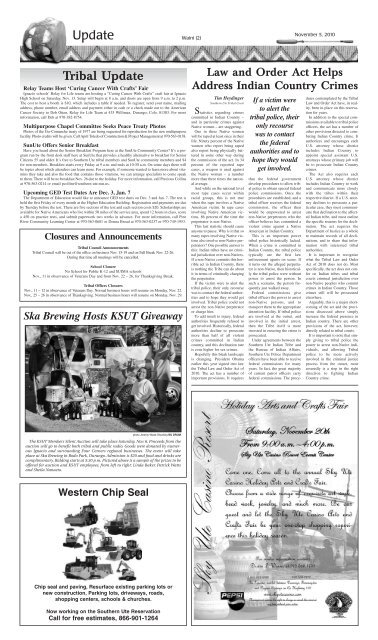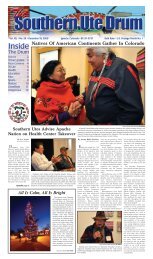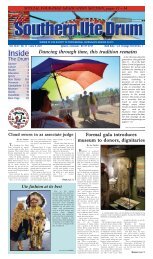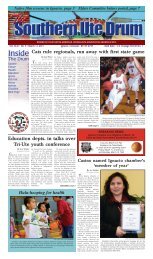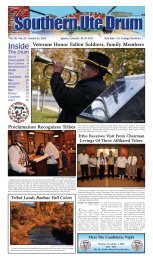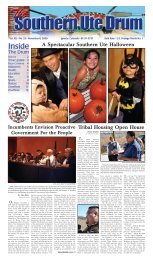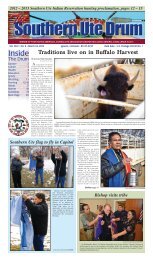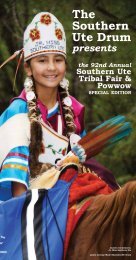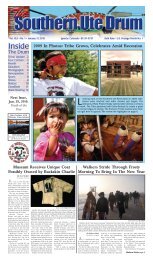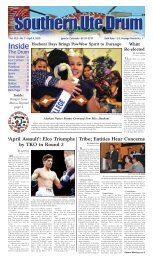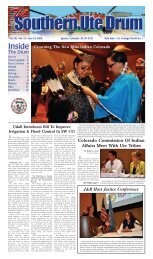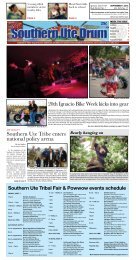November 5, 2010 - Southern Ute Indian Tribe
November 5, 2010 - Southern Ute Indian Tribe
November 5, 2010 - Southern Ute Indian Tribe
You also want an ePaper? Increase the reach of your titles
YUMPU automatically turns print PDFs into web optimized ePapers that Google loves.
<strong>November</strong> 5, <strong>2010</strong><br />
Update Waini (2)<br />
Tribal Update<br />
Relay Teams Host ‘Curing Cancer With Crafts’ Fair<br />
Ignacio schools’ Relay for Life teams are hosting a “Curing Cancer With Crafts” craft fair at Ignacio<br />
High School on Saturday, Nov. 13. Setup will begin at 8 a.m. and doors are open from 9 a.m. to 2 p.m.<br />
The cost to host a booth is $10, which includes a table if needed. To register, send your name, mailing<br />
address, phone number, email address and payment either in cash or a check made out to the American<br />
Cancer Society to Deb Otten, Relay for Life Team at 435 Willimax, Durango, Colo. 81303. For more<br />
information, call Deb at 970-382-8754.<br />
Multipurpose Chapel Committee Seeks Peace Treaty Photos<br />
Photos of the <strong>Ute</strong>-Comanche treaty of 1977 are being requested for reproduction for the new multipurpose<br />
facility. Photo credits will be given. Call April Toledo of Construction & Project Management at 970-563-0138.<br />
Sun<strong>Ute</strong> Offers Senior Breakfast<br />
Have you heard about the Senior Breakfast Program here at the Sun<strong>Ute</strong> Community Center? It’s a program<br />
run by the front desk staff here at Sun<strong>Ute</strong> that provides a healthy alternative to breakfast for Senior<br />
Citizens 55 and older. It’s free to <strong>Southern</strong> <strong>Ute</strong> tribal members and Sun<strong>Ute</strong> community members and $4<br />
for non-members. Breakfast starts every Friday at 9 a.m. and ends at 10:30 a.m. On some days there will<br />
be topics about which attendees can learn more. For example, if someone wanted to learn more about vitamins<br />
they take and also the food that contains those vitamins, we can arrange specialists to come speak<br />
to them. There will be no breakfast Nov. 26 due to the holiday. For more information, call Precious Collins<br />
at 970-563-0214 or email pcollins@southern-ute.nsn.us.<br />
Upcoming GED Test Dates Are Dec. 3, Jan. 7<br />
The Department of Education would like to announce GED test dates on Dec. 3 and Jan. 7. The test is<br />
held the first Friday of every month at the Higher Education Building. Registration and payments are due<br />
by Tuesday before the test. There are five sections of the test and each section costs $20. Scholarships are<br />
available for Native Americans who live within 50 miles of the service area, spend 12 hours in class, score<br />
a 450 on practice tests, and submit paperwork two weeks in advance. For more information, call Pine<br />
River Community Learning Center at 970-563-0681 or Donna Broad at 970-563-0237 or 970-749-1953.<br />
Closures and Announcements<br />
Tribal Council Announcements<br />
Tribal Council will be out of the office on business Nov. 15-19 and on Fall Break Nov. 22-26.<br />
During that time all meetings will be cancelled.<br />
School Closure<br />
No School for Public K-12 and SUIMA schools<br />
Nov., 11 in observance of Veterans Day and from Nov. 22 – 26, for Thanksgiving Break.<br />
Tribal Offices Closures<br />
Nov., 11 – 12 in observance of Veterans Day. Normal business hours will resume on Monday, Nov. 22.<br />
Nov., 25 – 26 in observance of Thanksgiving. Normal business hours will resume on Monday, Nov. 29.<br />
Ska Brewing Hosts KSUT Giveaway<br />
Law and Order Act Helps<br />
Address <strong>Indian</strong> Country Crimes<br />
Tim Heydinger<br />
<strong>Southern</strong> <strong>Ute</strong> Tribal Court<br />
Statistics regarding crimes<br />
committed in <strong>Indian</strong> Country –<br />
and in particular crimes against<br />
Native women – are staggering.<br />
One in three Native women<br />
will be raped at least once in their<br />
life. Ninety percent of the Native<br />
women who report being raped<br />
also report being physically battered<br />
in some other way during<br />
the commission of the act. In 34<br />
percent of the reported rape<br />
cases, a weapon is used against<br />
the Native woman – a number<br />
more than three times the national<br />
average.<br />
And while on the national level<br />
most rape cases occur within<br />
racial groups, this is not true<br />
when the rape involves a Native<br />
American victim. In rape cases<br />
involving Native American victims,<br />
86 percent of the time the<br />
perpetrator is non-Native.<br />
This last statistic should cause<br />
anyone to pause. Why is it that so<br />
many rapes involving Native victims<br />
also involve non-Native perpetrators?<br />
One possible answer is<br />
this: <strong>Indian</strong> tribes have no criminal<br />
jurisdiction over non-Natives.<br />
If a non-Native commits this horrible<br />
act in <strong>Indian</strong> Country, there<br />
is nothing the <strong>Tribe</strong> can do about<br />
it in terms of criminally charging<br />
the perpetrator.<br />
If the victim were to alert the<br />
tribal police, their only recourse<br />
was to contact the federal authorities<br />
and to hope they would get<br />
involved. Tribal police could not<br />
arrest the non-Native perpetrator<br />
or charge him.<br />
To add insult to injury, federal<br />
authorities frequently refused to<br />
get involved. Historically, federal<br />
authorities decline to prosecute<br />
more than half of all violent<br />
crimes committed in <strong>Indian</strong><br />
country, and this declination rate<br />
is even higher for sex crimes.<br />
Hopefully this bleak landscape<br />
is changing. President Obama<br />
earlier this year signed into law<br />
the Tribal Law and Order Act of<br />
<strong>2010</strong>. The act has a number of<br />
important provisions. It requires<br />
If a victim were<br />
to alert the<br />
tribal police, their<br />
only recourse<br />
was to contact<br />
the federal<br />
authorities and to<br />
hope they would<br />
get involved.<br />
that the federal government<br />
develop procedures to allow tribal<br />
police to obtain special federal<br />
police commissions. Once the<br />
procedures are established, and a<br />
tribal officer receives the federal<br />
commission, the officer then<br />
would be empowered to arrest<br />
non-Native perpetrators who the<br />
officer believes has committed a<br />
violent crime against a Native<br />
American in <strong>Indian</strong> Country.<br />
This is an important power<br />
tribal police historically lacked.<br />
When a crime is committed in<br />
<strong>Indian</strong> Country, the tribal police<br />
typically are the first law<br />
enforcement agents on scene. If<br />
it turns out the alleged perpetrator<br />
is non-Native, then historically<br />
the tribal police were without<br />
power to arrest the person. In<br />
such a scenario, the person frequently<br />
just walked away.<br />
Federal commissions give<br />
tribal officers the power to arrest<br />
non-Native persons, and to<br />
transport them to the appropriate<br />
detention facility. If tribal police<br />
are involved at the outset, and<br />
involved in the initial arrest,<br />
then the <strong>Tribe</strong> itself is more<br />
invested in ensuring the crime is<br />
prosecuted.<br />
Under agreements between the<br />
<strong>Southern</strong> <strong>Ute</strong> <strong>Indian</strong> <strong>Tribe</strong> and<br />
the Bureau of <strong>Indian</strong> Affairs,<br />
<strong>Southern</strong> <strong>Ute</strong> Police Department<br />
officers have been able to receive<br />
federal commissions for many<br />
years. In fact, the great majority<br />
of current patrol officers carry<br />
federal commissions. The procedures<br />
contemplated by the Tribal<br />
Law and Order Act have, in reality,<br />
been in place on this reservation<br />
for years.<br />
In addition to the special commissions<br />
available to tribal police<br />
officers, the act has a number of<br />
other provisions directed to combating<br />
<strong>Indian</strong> Country crime. It<br />
authorizes and encourages each<br />
U.S. attorney whose district<br />
includes <strong>Indian</strong> Country to<br />
appoint special assistant U.S.<br />
attorneys whose primary job will<br />
be to prosecute <strong>Indian</strong> Country<br />
crimes.<br />
The Act also requires each<br />
U.S. attorney whose district<br />
includes <strong>Indian</strong> Country to work<br />
and communicate more closely<br />
with the tribes within their<br />
respective district. If a U.S. attorney<br />
declines to prosecute a particular<br />
case, they must communicate<br />
that declination to the affected<br />
<strong>Indian</strong> tribe, and must outline<br />
the specific reasons for the declination.<br />
The act requires the<br />
Department of Justice as a whole<br />
to maintain records of all declinations,<br />
and to share that information<br />
with interested tribal<br />
authorities.<br />
It is important to recognize<br />
what the Tribal Law and Order<br />
Act of <strong>2010</strong> does not do. Most<br />
specifically, the act does not confer<br />
on <strong>Indian</strong> tribes and tribal<br />
courts criminal jurisdiction over<br />
non-Native peoples who commit<br />
crimes in <strong>Indian</strong> Country. Those<br />
crimes still will be prosecuted<br />
elsewhere.<br />
Arguably, this is a major shortcoming<br />
of the act and the provisions<br />
discussed above simply<br />
increase the federal presence in<br />
<strong>Indian</strong> country. There are other<br />
provisions of the act, however,<br />
directly related to tribal courts.<br />
It is important to note that simply<br />
giving to tribal police the<br />
power to arrest non-Native individuals,<br />
and allowing Tribal<br />
police to be more actively<br />
involved in the criminal justice<br />
process from the outset, most<br />
assuredly is a step in the right<br />
direction to fighting <strong>Indian</strong><br />
Country crime.<br />
photo Jeremy Wade Shockley/SU DRUM<br />
The KSUT Members Silent Auction will take place Saturday, Nov. 6. Proceeds from the<br />
auction will go to benefit both tribal and public radio. Goods were donated by numerous<br />
Ignacio and surrounding Four Corners regional businesses. The event will take<br />
place at Ska Brewing in Bodo Park, Durango. Admission is $20 and food and drinks are<br />
complimentary. Bidding starts at 5:30 p.m. Pictured above is a sample of the prizes to be<br />
offered for auction and KSUT employees, from left to right: Linda Baker, Patrick Watts<br />
and Sheila Nanaeto.<br />
Western Chip Seal<br />
Chip seal and paving, Resurface existing parking lots or<br />
new construction, Parking lots, driveways, roads,<br />
shopping centers, schools & churches.<br />
Now working on the <strong>Southern</strong> <strong>Ute</strong> Reservation<br />
Call for free estimates, 866-901-1264


